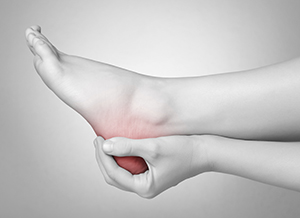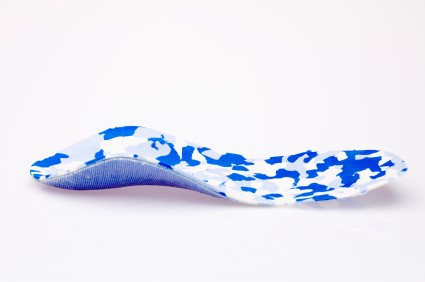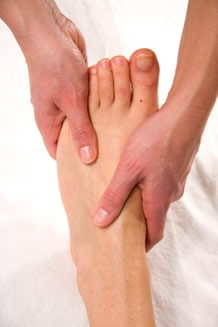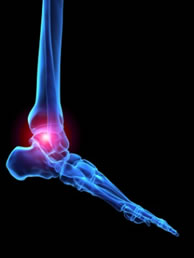
 Heel pain is a condition that plagues many people, and chronic cases of the condition can be especially difficult to endure. For many common cases of chronic heel pain, plantar fasciitis is the underlying culprit; plantar fasciitis affects all types of people, though most commonly active men between the ages of 40 and 70. Plantar fasciitis pain manifests in various ways. For some people, it can be described as a dull pain; in other cases, people feel it as a sharp pain or a burning sensation or ache that extends outward from the heel. There are various factors that can contribute to plantar fasciitis; to determine the cause of your heel pain and the best way to treat it, consult with your podiatrist.
Heel pain is a condition that plagues many people, and chronic cases of the condition can be especially difficult to endure. For many common cases of chronic heel pain, plantar fasciitis is the underlying culprit; plantar fasciitis affects all types of people, though most commonly active men between the ages of 40 and 70. Plantar fasciitis pain manifests in various ways. For some people, it can be described as a dull pain; in other cases, people feel it as a sharp pain or a burning sensation or ache that extends outward from the heel. There are various factors that can contribute to plantar fasciitis; to determine the cause of your heel pain and the best way to treat it, consult with your podiatrist.
Many people suffer from bouts of heel pain. For more information, contact Dr. Robert Hope of Riverside Podiatry. Our doctors will treat your foot needs.
Causes of Heel Pain
● Heel pain is often associated with plantar fasciitis. The plantar fascia is a band of tissues that extends along the bottom of the foot. A rip or tear in this ligament can cause inflammation of the tissue.
● Achilles tendonitis is another cause of heel pain. Inflammation of the Achilles tendon will cause pain from fractures and muscle tearing. Lack of flexibility is also another symptom.
● Heel spurs are another cause of pain. When the tissues of the plantar fascia undergo a great deal of stress, it can lead to ligament separation from the heel bone, causing heel spurs.
Why Might Heel Pain Occur?
- Wearing ill-fitting shoes
- Wearing non-supportive shoes
- Weight change
- Excessive running
Treatments
Heel pain should be treated as soon as possible for immediate results. Keeping your feet in a stress free environment will help. If you suffer from Achilles tendonitis or plantar fasciitis, applying ice will reduce the swelling. Stretching before an exercise like running will help the muscles. Using all these tips will help make heel pain a thing of the past.
With the advancements in technology and greater knowledge of how muscles and joints work, physical therapists can turn things around dramatically.
If you have any questions, please feel free to contact our office located in Tuscaloosa, AL. We offer the newest diagnostic and treatment technologies for all your foot care needs.
 Custom orthotics are foot devices that are inserted into your shoes to help accommodate and treat your foot conditions. Orthotics provide support for the arches of your feet, distributing pressure more evenly across the feet and helping to relieve pain in target areas, depending on your condition. Creating orthotics involves using a plaster casting based on the patient’s foot shape. Your doctor or physical therapist will properly customize your orthotics to fit your specific feet.
Custom orthotics are foot devices that are inserted into your shoes to help accommodate and treat your foot conditions. Orthotics provide support for the arches of your feet, distributing pressure more evenly across the feet and helping to relieve pain in target areas, depending on your condition. Creating orthotics involves using a plaster casting based on the patient’s foot shape. Your doctor or physical therapist will properly customize your orthotics to fit your specific feet.
If you are having discomfort in your feet and would like to try orthotics, contact Dr. Robert Hope from Riverside Podiatry. Dr. Hope will assist you with all of your foot needs.
What are Orthotics?
Orthotics are inserts you can place into your shoes to help with a variety of foot problems such as flat feet or foot pain. Orthotics provide relief and comfort for minor foot and heel pain, but can’t correct serious biomechanical problems in your feet.
Over-the-Counter Inserts
Orthotics come in a wide variety of over-the-counter inserts that are used to treat foot pain, heel pain, and minor problems. For example, arch supports can be inserted into your shoes to help correct over arched or flat feet, while gel insoles are often used because they provide comfort and relief from foot and heel pain by alleviating pressure.
Prescription Orthotics
If over-the-counter inserts don’t work for you, or if you have a more severe foot issue, it is possible to have your podiatrist prescribe custom orthotics. These high quality inserts are designed to treat problems such as abnormal motion, plantar fasciitis, and more severe heel pain. They can even be used to help patients suffering from diabetes by treating foot ulcers and painful calluses, and are usually molded to your feet individually, which allows them to provide full support and comfort.
If you are experiencing minor to severe foot or heel pain, it’s recommended to speak with your podiatrist on the possibilities of using orthotics. A podiatrist can determine which type of orthotic is right for you and allow you to take the first steps towards being pain free.
If you have any questions please feel free to contact our office located in Tuscaloosa, AL. We offer the newest diagnostic and treatment technologies for all your foot needs.
 If you have symptoms of a burning sensation in your feet, you may have any number of conditions. The sensation of burning in the feet can be either minor or severe, affect people over 50, and occur most frequently during the night. Nerve damage from diabetes, vitamin deficiency or alcoholism, obesity, strain on the feet, overheated feet, eczema or dermatitis, blood disorders, or any other impairment of the feet’s nerves can all lead to the described burning sensation. Seeing your podiatrist is vital to understanding any underlying causes. Make sure that you are wearing properly-fitting shoes as well.
If you have symptoms of a burning sensation in your feet, you may have any number of conditions. The sensation of burning in the feet can be either minor or severe, affect people over 50, and occur most frequently during the night. Nerve damage from diabetes, vitamin deficiency or alcoholism, obesity, strain on the feet, overheated feet, eczema or dermatitis, blood disorders, or any other impairment of the feet’s nerves can all lead to the described burning sensation. Seeing your podiatrist is vital to understanding any underlying causes. Make sure that you are wearing properly-fitting shoes as well.
When dealing with systemic diseases of the feet, it is extremely important to check the affected areas routinely so that any additional problems are caught quickly. If you have any concerns about your feet contact Dr. Robert Hope from Riverside Podiatry. Dr. Hope will assist you with all of your foot needs.
Systemic Diseases of the Feet
Systemic diseases affect the whole body, and symptoms usually are displayed in the feet. This condition can make a patient’s ability to walk unbearable. Systemic diseases include gout, diabetes mellitus, neurological disorders, and arthritis.
Gout – is caused by an excess of uric acid in the body. Common symptoms include pain, inflammation, and redness at the metatarsal/phalangeal joint of the base big toe. Gout can be treated by NSAIDs to relieve pain and inflammation, and other drugs that lower the acid levels in the body.
Diabetes mellitus – is an increase in the level of blood sugar that the body cannot counteract with its own insulin. Failure to produce enough insulin is a factor in Diabetes.
Diabetes of the Feet
Diabetic Neuropathy – may lead to damaged nerves and affect the feet through numbness and loss of sensation.
Peripheral Vascular Disease – can restrict the blood flow to the feet, and often times lead to amputation of the feet.
If you have any questions please feel free to contact our office located in Tuscaloosa, AL. We offer the newest diagnostic and treatment technologies for all your foot needs.
There are several systemic diseases, or diseases that affect the whole body, that either display symptoms in the feet or affect the health of the feet. Common systemic diseases that affect the overall health of the feet, and the patient’s ability to walk comfortably, include gout, diabetes mellitus, neurological disorders, and arthritis.
In gout, which is caused by an excessive buildup of uric acid in the body, the most common symptoms of pain, inflammation, and redness occur at the metatarsal/phalangeal joint at the base of the big toe. Any excess levels of uric acid, crystallize and are deposited in tendons, joints, and surrounding bone and muscle tissue. Gout is commonly treated with NSAIDs to relieve pain and inflammation and other drugs to lower uric acid levels in the body. Gout most commonly affects those who are overweight, have low protein diets and lead a more sedentary lifestyle.
Diabetes mellitus is an increase in the level of blood sugar in which the body cannot counteract with naturally occurring insulin in the body. The three types of diabetes, Type I, Type II and Gestational Diabetes, are all signs the body is either not producing enough insulin or is not efficiently using the insulin that is produced. Gestational diabetes only affects women who are pregnant and have never, prior to pregnancy, exhibited symptoms of the disease.
There are two main issues that affect the feet that are commonly caused by diabetes. They include diabetic neuropathy and peripheral vascular disease. Diabetic neuropathy can lead to damaged nerves and affect the feet through numbness and loss of sensation. Peripheral vascular disease restricts the flow of blood to the foot and can, in extreme cases, lead to the necessity of amputating the foot. Peripheral issues that are caused by diabetes and can affect the foot include athlete’s foot, nail infections, corns, blisters, bunions, severe dry skin, plantar warts and ingrown toenails. These can all be attributed to the decrease of blood flow to the foot.
Neurological disorders and rheumatoid arthritis can also have severe impact on the health of the feet. Neurological disorders can affect the nerves in the main structure of the foot and cause loss of sensation and possible decreased muscle response. Rheumatoid arthritis can affect the bones and joint structures of the foot, making it impossible to walk normally without serious pain.
All systemic diseases that affect the foot can effectively be treated to minimize joint and muscle damage if they are diagnosed early and treated with medication and lifestyle therapy. Diabetes patients must monitor their blood sugar levels and work with their physician to keep their levels as close to normal as possible. Rheumatoid arthritis patients should work with their physician to ensure the proper medications are being taken to reduce the amount of damage to the joints of the body.
 Arthritis is a condition that affects not only the hands and wrists, but feet as well. There are more than 50 million people in the US that are currently diagnosed with arthritis and there are a lot of different opinions on how to effectively treat the disease. Frequently it is difficult to parse through what does work and what doesn’t. Arthritis can be painful, especially when it affects the foot area. When trying to manage this pain, it is important to be informed on what types of treatments are effective, keeping in mind that some can actually be harmful. The CDC has recently released a report that outlines some good and bad treatments for this chronic ailment.
Arthritis is a condition that affects not only the hands and wrists, but feet as well. There are more than 50 million people in the US that are currently diagnosed with arthritis and there are a lot of different opinions on how to effectively treat the disease. Frequently it is difficult to parse through what does work and what doesn’t. Arthritis can be painful, especially when it affects the foot area. When trying to manage this pain, it is important to be informed on what types of treatments are effective, keeping in mind that some can actually be harmful. The CDC has recently released a report that outlines some good and bad treatments for this chronic ailment.
Arthritis can be a difficult condition to live with. If you are seeking treatment, contact Dr. Robert Hope from Riverside Podiatry. Dr. Hope will assist you with all of your foot needs.
Arthritic Foot Care
Arthritis is a joint disorder that involves inflammation of different joints in your body, such as in your feet. Arthritis is often caused by a degenerative joint disease and causes mild to severe pain in all affected areas. On top of this, swelling and stiffness in the affected joints can also be a common symptom of arthritis.
In many cases, wearing ill-fitting shoes can worsen the effects and pain of arthritis. Wearing shoes that have a lower heel and extra room can help your feet feel more comfortable. In cases of rheumatoid arthritis, the arch in your foot may become problematic. Buying shoes with proper arch support that contour to your feet can help immensely.
Alleviating Arthritic Pain
It is best to see your doctor for the treatment that is right for your needs and symptoms. Conditions vary, and a podiatrist can help you determine the right method of care for your feet.
If you have any questions please feel free to contact our office located in Tuscaloosa, AL. We offer the newest diagnostic and treatment technologies for all your foot needs.